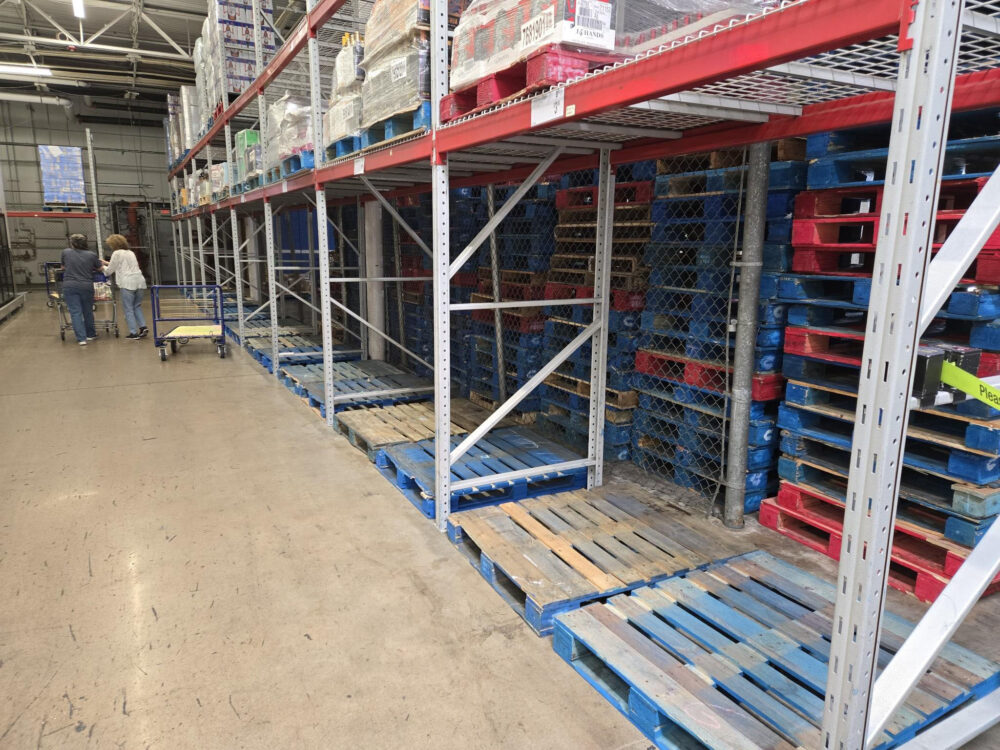
Tamir Buford
Only a few days into the longshoremen strike, some Texans are “panic buying” toilet paper and other necessities, but experts said there is no need to.
At midnight on Tuesday, the contract between the ports and approximately 45,000 members of the International Longshoremen’s Association expired. As a result, dockworkers at 36 ports from Maine to Houston went on strike.
While a prolonged strike could affect the availability of electronics, car parts and some fruits, Edward Anderson, with the University of Texas McCombs School of Business, said it will not affect toilet paper or other domestically produced items.
“The reason they don’t have to worry is that the things that we are most likely to run out of in the near future are things like bananas and pineapples and a few other items of fresh produce,” said Anderson who’s also the head of the industrial policy group at the McCombs supply chain center. “Things like bottled water and toilet paper, those are actually made in the U.S. There’s not going to be a shortage there.”
On Thursday morning, Harris County Judge Lina Hidalgo spoke to the striking workers at the Port of Houston. Hidalgo said panic buying could lead to price gouging and inflation.
“It avalanches. And so, I think people are beginning to think about it. A few people might be beginning to act on it,” Hidalgo said. “And now’s the time to say ‘You guys, let’s not throw our region into an economic problem unnecessarily.’”
Hidalgo also said the county would be monitoring the local supply of consumer goods and medical supplies.
Ports, distributors and storefronts have known for several months about the possible strike, so they have had time to prepare, Anderson said.
“Almost all the Halloween goods that [are] going to be sold at Halloween already entered the country,” he said. “Other factories have been stockpiling inventory, but because of their nature, they can only do maybe a few days to a week or two weeks top. Things are too expensive to buy ahead of time and store.”
Perishable imports like specialty fruits could be impacted early on into the strike, Anderson said.
“With respect to fruits and vegetables that are coming up from South America or Central America, they’re going to notice that within a week because it only stays fresh that long,” he said. “You really can’t stockpile more than a couple of days of it. You’ve got to get fresh stuff from refrigerated units coming up through ships into the Port of Houston.”
Since the U.S.’s West Coast ports are still open, Anderson said they can take on some additional loads, but only to a certain point.
“The West Coast can handle about 20% more volume than it does currently, roughly speaking, and we’re losing 50% of our trade volume on the East Coast,” he said. “That extra 20%, it doesn’t cover the gap. … We know from the pandemic there’s more and more congestion at those ports, they’re not going to be able to handle 20% more. In fact, it actually might dip.”
One of the main reasons that an extended strike could cause a cascading effect is due to the high efficiency that the supply chain normally runs at, Texas A&M University industrial distribution professor Eleftherios Iakovou said.
“Most of these industrial sectors work under ‘just in time’ production schemes,” he said. “Whenever we cannot sustain the smooth flow of imported containers within the U.S., the economy will dramatically suffer.”
Iakovou said the economic impact would be mainly concentrated on the manufacturing side of the economy, not the actual store shelves with everyday necessities, like toilet paper.
“The impact on our economy will be huge [but] not necessarily for the big retailers,” he said. “When we talk about supply chains for the nations, the impact will be huge in manufacturing, fresh produce, coffee, plywood, plastic, raisins, auto parts. … once they don’t receive raw materials or semi-finished goods, they will suffer.”
Despite the economic uncertainty, Anderson — who stressed that he’s not a political expert — said the mounting pressure will likely intensify the desire for a deal, especially if President Biden decides to get involved. Currently, Biden has declined to step in and said it was up to the two sides to make a deal.
“I’m speculating here, but if Biden is going to move in and do anything, I would imagine he would want to do it sooner, rather than later,” he said. “He is a lame duck president, so he doesn’t have to worry about getting reelected and things will really begin to bite in about two to three weeks.”
Patricia Ortiz and Tom Perumean contributed to this article.




![Tyson Foods Plant [Photo: Food Manufacturing]](https://southarkansassun.com/wp-content/uploads/2023/08/iStock_1185520857__1_.5e441daa51cca-600x337.jpg)








![Silverado Senior Living Management Inc. [Photo: Los Angeles Times]](https://southarkansassun.com/wp-content/uploads/2023/10/download-6-4-600x337.jpg)

![China's Wuhan Institute of Virology [Photo: Nature]](https://southarkansassun.com/wp-content/uploads/2023/09/d41586-021-01529-3_19239608-600x337.jpg)















